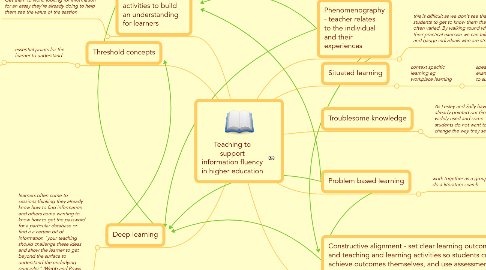Teaching to support information fluency in higher education
by sarah haygarth


1. Social constructivism - use activities to build an understanding for learners
1.1. Get them to work, looking for information for an essay they're already doing to help them see the value of the session
2. Deep learning
2.1. learners often come to sessions thinking they already know how to find information and others come wanting to know how to get the password for a particular database or find a a certain bit of information "your teaching should challenge these ideas and allow the learner to get beyond the surface to understand the underlying principles" (Webb and Powis, 2004)
3. Threshold concepts
3.1. essential points for the learner to understand
3.1.1. I love the Eureka moment - for me it's often when students grasp the difference between searching the eresources and ejournals
4. Phenomenography - teacher relates to the individual and their experiences
4.1. this is difficult as we don't see that much of the students to get to know them that well and abilities are often varied. By walking round when the students have their practical exercise we can talk to them individually and gauge indivduals who are struggling.
5. Constructive alignment - set clear learning outcomes and teaching and learning activities so students can achieve outcomes themselves, and use assessment containing same terms.
5.1. in Information Fluency sessionswe give the students learning outcomes and activities to help them achieve them, we need to build on this with assessment and thinking more clearly about the learning outcomes
6. Situated learning
6.1. context specific learning eg workplace learning
6.1.1. speak the same language -so use examples in information fluency relevant to subject area
